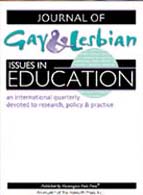
|
Journal of Gay & Lesbian Issues in Education: an international quarterly devoted to research, policy and practice; edited by James T. Sears, Ph.D., Harrington Park Press, Volume 1, Number 1 2003
It seems odd, to say the least, when we note that teachers and school officials need to be told under the threat of legal action, that they must agree to the following points: School officials will not disclose any student's sexual orientation to others; School officials will not punish students for talking during non-instructional time about their sexual orientation;
In the above reported case the school district found itself forced to issue a formal apology to a mistreated student and to his parents, paying a total of $25,000 in damages and attorneys' fees. Taxpayers, in an era when county and state educational funds are meager, may want to take notice. Aside from a host of vile injustices perpetrated by ignorant school officials, the damages are not only personal, they are financial. My own experience as an openly gay public school student extends back in time to 1951 when, as a 7th grade student at Ardmore Junior High (Pennsylvania) the principal, Mr. Snow, telephoned my best friend's mother and told her to deny her son the right to free association with me. I felt devastated by this experience. Shortly thereafter, my self-esteem was even further shaken by an in-law whose prurient question, "Just what do you want to do with this boy?" elicited a dramatic reply that reflected my ignorance of sex acts between males that I'd discover only later. I answered: "I want to sink my lips in the soft brown skin of his belly." My in-law's ashen face registered a shock beyond measure. "Oh Jack," she gasped, "You are sick." This adult's unsparing evaluation of my mind-state induced suicidal feelings in my young mind. Less than a week later, before going to bed one night, I swallowed a hundred aspirins and fell asleep. I didn't die, but I did wake up green-faced and terribly sick to my stomach. There can be said to have been a happy ending, however. A decade later, inspired in large part by these injustices I'd suffered as a teen, I co-founded The Mattachine Society of Washington, the nation's first gay and lesbian direct-action civil rights organization. Today, however, while I've lived to see consensual same-sex acts declassified as illegal, no longer classified as a disease, the social injustices such as I'd experienced a half-century ago remain rampant in my own country and in many others. Just before the U.S. Supreme Court decision abolishing the Texas sodomy law, I was moved by an account in a June 21 letter to The Philadelphia Inquirer, a paper that circulates in the Ardmore neighborhood where my junior high school principal had forbade me the joys of a meaningful friendship. The letter-writer said: "My third-grade teacher, whom I respected, trusted and admired, verbally abused me in front of the entire class one day by calling me a "sissy." I was stunned and humiliated beyond words. Despite her quiet apology to me as I left the classroom to go home, the damage was done. The experience was so mortifying to me that I was unable to speak of it to anyone, not even my parents. It wasn't until I was in college that I finally was able to bring myself to tell my closest friend about it. It took many years for me to realize that I was not to blame, that my teacher was the one who had done wrong…My point is that there should be zero tolerance for any kind of harassment in schools by students, but especially by teachers."
|
 The need for circulating this Journal among educators worldwide is illustrated in GayToday's July 18 Top Story: "Arkansas Public School Pays Settlement to Mistreated Student."
The need for circulating this Journal among educators worldwide is illustrated in GayToday's July 18 Top Story: "Arkansas Public School Pays Settlement to Mistreated Student."  Journal of Gay and Lesbian Issues in Education's editor, James T. Sears, PhD.
Journal of Gay and Lesbian Issues in Education's editor, James T. Sears, PhD.